Nuala Ní Chonchúir's Blog, page 42
January 7, 2014
WILLIAM TREVOR SCHOLARSHIP
 William TrevorThis scholarship honours the contribution to literature of Irish novelist and short story writer, William Trevor. The scholarship is open to all students worldwide who would welcome an opportunity to attend the Cork Writers' School in July. (I'm teaching there this year, as are Mary O'Donnell, Leanne O'Sullivan and John McKenna.) Speakers at the school include Hilary Lennon, Thomas McCarthy and Eibhear Walshe.
William TrevorThis scholarship honours the contribution to literature of Irish novelist and short story writer, William Trevor. The scholarship is open to all students worldwide who would welcome an opportunity to attend the Cork Writers' School in July. (I'm teaching there this year, as are Mary O'Donnell, Leanne O'Sullivan and John McKenna.) Speakers at the school include Hilary Lennon, Thomas McCarthy and Eibhear Walshe.The scholarship will cover the cost of tuition, accommodation (bed and breakfast) at the Summer School and transport to and from all organised social and cultural events. It will not cover travel costs or admission charges. Applications will be judged by a panel on the basis of academic merit and reasons for taking the course. Applicants must be aged 18 or over by 1 January 2014. Free to enter. Deadline: 7th March 2014 More here.
Published on January 07, 2014 05:12
January 6, 2014
NOLLAIG NA mBAN & THE DEAD iPAD APP
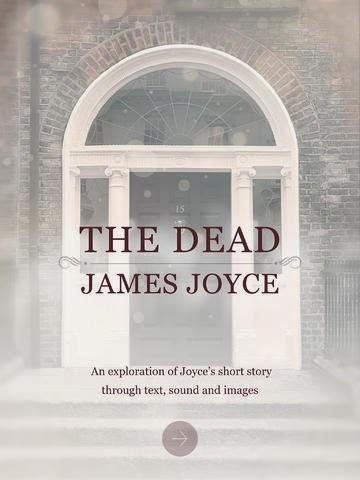
Happy Nollaig na mBan/Women's Christmas/Feast of the Epiphany to all the readers of this blog.
Joyce's masterpiece short story 'The Dead' was set on this day in Dublin, so I shall be reading it again later when I am finished with my edits on Novel 3 (going well!).
But here's something fun (even though I don't own an i-anything) - there is a new app of the story available for free for iPad. The app launched today to mark the centenary of the publication of Joyce's collection Dubliners. The new app from UCD Humanities Institute includes the full story read by actor Barry McGovern plus period images and podcast commentaries and is available free from the Apple App Store.
The app also includes:
• Podcasts which contextualise the story by commentators such as Catriona Crowe, Mary Daly, Anne Fogarty and Gerardine Meaney about Joyce, Dubliners, and the Dublin of the time.
• Rare and unseen images of Dublin in 1914.
• Architectural images and drawings describing the house and the architecture of the era.
• A video performance of The Lass of Aughrim filmed in the house on Usher's Island.
My husband informs me that you can download a virtual iPad so I may get to see this yet. Meanwhile, Apple fans, enjoy!
Published on January 06, 2014 04:22
January 3, 2014
DAVY BYRNE'S DEADLINE LOOMS
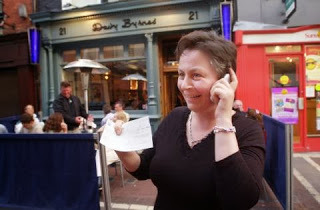 Anne Enright, former winner & current judge of the Davy Byrne's AwardThere is just one month to go to the Davy Byrne's Short Story Award deadline. Eek. That rather scuppers my plan to complete my story on my Welsh retreat at Gladstone's Library at the end of this month. I have no idea how I am going to finish it on time now as I am under deadline with Novel 3 and the Novel 2 PR stuff is just about to go into overdrive. Anyway, finish it I must because I began it with this comp in mind and don't want to not enter as that would feel wrong.
Anne Enright, former winner & current judge of the Davy Byrne's AwardThere is just one month to go to the Davy Byrne's Short Story Award deadline. Eek. That rather scuppers my plan to complete my story on my Welsh retreat at Gladstone's Library at the end of this month. I have no idea how I am going to finish it on time now as I am under deadline with Novel 3 and the Novel 2 PR stuff is just about to go into overdrive. Anyway, finish it I must because I began it with this comp in mind and don't want to not enter as that would feel wrong.The Skinny:
Prize: €15,000 first prize, plus five runner-up prizes of €1,000
Judges: Anne Enright (winner of the inaugural Davy Byrne's Award), Yiyun Li and Jon McGregor
Rules:
The competition is open to Irish citizens and to writers who are resident or were born in the thirty-two counties. Entries must consist of a previously unpublished short story written in English. The maximum word count is 15,000 words, no minimum. Only one story per entrant.
Entries must be posted/delivered to Davy Byrnes Short Story Award, c/o Dublin UNESCO City of Literature, Dublin City Libraries, 138-144 Pearse Street, Dublin 2, Ireland.
The deadline for receipt of entries is Monday Feb 3rd 2014. There is a €10 entry fee, payable online or by cheque/postal order.
The six short-listed writers will be announced in late May/early June 2014 and the overall winner announced in June 2014.
Published on January 03, 2014 09:02
January 1, 2014
ARENA PODCAST & DAN POWELL BEST READS
You can listen back to the NYE's Arena on which I read my story from the anthology New Planet Cabaret, 'Sunasawsta', and nattered a bit with Seán Rocks about my novel due in April.
Others featured included Jessica Traynor, Sonya Kelly, Dave Lordan, the ever-cute Temper-Mental MissElayneous, Paul Timoney and the soon-to-be-début-novelist Rob Doyle, among many more. We had a fun evening in the studio. I followed it with a noise-laden night in a local hotel. I am starting to loathe staying in Irish hotels - drunken din-makers, I hate ye all.
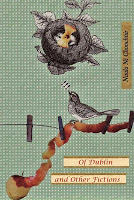
In other news Dan Powell has chosen my chapbook of flash Of Dublin and Other Fictions as one of his best reads of 2013. Lovely. He also liked Carys Bray's book and Jon McGregor's. See here.
Others featured included Jessica Traynor, Sonya Kelly, Dave Lordan, the ever-cute Temper-Mental MissElayneous, Paul Timoney and the soon-to-be-début-novelist Rob Doyle, among many more. We had a fun evening in the studio. I followed it with a noise-laden night in a local hotel. I am starting to loathe staying in Irish hotels - drunken din-makers, I hate ye all.

In other news Dan Powell has chosen my chapbook of flash Of Dublin and Other Fictions as one of his best reads of 2013. Lovely. He also liked Carys Bray's book and Jon McGregor's. See here.
Published on January 01, 2014 23:00
MARY MORRISSY INTERVIEW
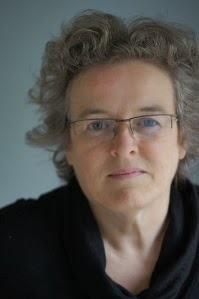 Writer Mary MorrissyHappy new year, blog readers. I wish you all creativity and prosperity in 2014. I want to kick the year off as I mean to continue: featuring fabulous writers. I am delighted to start this first day of the year with one of my literary heroines, Mary Morrissy. Her new novel
The Rising of Bella Casey
is published by Brandon and it is a re-imagining of the life of playwright Sean O'Casey's sister Bella. The novel is beautifully written and moving; one of my top reads of 2013.
Writer Mary MorrissyHappy new year, blog readers. I wish you all creativity and prosperity in 2014. I want to kick the year off as I mean to continue: featuring fabulous writers. I am delighted to start this first day of the year with one of my literary heroines, Mary Morrissy. Her new novel
The Rising of Bella Casey
is published by Brandon and it is a re-imagining of the life of playwright Sean O'Casey's sister Bella. The novel is beautifully written and moving; one of my top reads of 2013.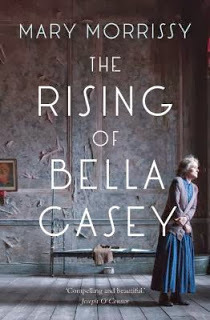 Mary is originally from Dublin and has won many awards for her fiction. She is the author of three novels, Mother of Pearl, The Pretender and The Rising of Bella Casey, and a collection of short stories, A Lazy Eye. She has taught creative writing at university level in the US and Ireland for the past decade and is also an individual literary mentor. She currently teaches on the MA in Creative Writing at University College Cork. Mary blogs here.
Mary is originally from Dublin and has won many awards for her fiction. She is the author of three novels, Mother of Pearl, The Pretender and The Rising of Bella Casey, and a collection of short stories, A Lazy Eye. She has taught creative writing at university level in the US and Ireland for the past decade and is also an individual literary mentor. She currently teaches on the MA in Creative Writing at University College Cork. Mary blogs here.*
Welcome, Mary. Your novel The Rising of Bella Casey has been well received, gaining excellent reviews in The Irish Times and on RTE's Arena programme, among other places. Tell me about the genesis of the book.
Thanks, Nuala, for the invite to appear on your blog. I first came across Bella Casey’s story in The Glamour of Grammar, an academic book on Sean O’Casey’s Dublin trilogy, by Colbert Kearney – who also happens to be my better half. He made reference to Bella’s life and the fact that O’Casey had written his sister out of his autobiographies. I can still remember the moment, and that special tingle you get when you recognize the spark that will ignite your next novel.
A novel like this takes a lot of research. How did you enjoy the research process and how did you conduct it?
I started off by reading O’Casey’s six volumes of autobiography, as well as his three volumes of letters. I also read the many biographies of the playwright. I was lucky enough to be awarded a research fellowship at the Cullman Centre for Writers and Scholars at the New York Public Library, where a lot of O’Casey’s papers are held, including fragments that he cut from his autobiographies regarding Bella. Because I was surrounded by so much research material at the NYPL, I approached Bella in a different way. Usually I write first, then do the research; this time I did the research first. Normally I don’t like research but you couldn’t possibly not enjoy working at the haven that is the NYPL.
I learnt a lot reading the book – I wasn’t aware that Seán O’Casey was a Protestant, for example. What is the novelist’s responsibility to the truth, especially when there are real people involved?
Protestantism is crucial to understanding O’Casey – and Bella – if only to understand how far O’Casey travelled from his roots. Here’s a man who became a nationalist, Irish speaker, socialist, communist and atheist and who wrote in complete opposition to his own tribe. As for responsibility to the truth, I think what the novelist should be most concerned with is emotional truth. I have a rule of thumb about writing about real people – which I’ve done a lot of. Where the facts are known you should stay faithful to them; where they’re not you are free to invent.
I loved Bella. Her fall from grace – though she always retained a pretence of dignity – was hard to witness. Were parts of the novel difficult to write, in an emotional way?
It was all difficult to write! This novel had a long, hard genesis. But there were times when I felt a little like O’Casey in dread of Bella’s decline. I wasn’t just witnessing the decline but actively subjecting her to all sorts of trials and tribulations. But apart from the attentions of the wicked Reverend Leeper, which is speculative on my part, all of Bella’s other misfortunes were true, so I had to stay true to them.
Reverend Leeper is a convincing villain; Bella’s husband is also not an endearing man. And Seán comes off as self-focused and lacking in empathy. Is this essentially a book about gender and women’s lack of choice?
Well, I’m glad to hear that the Reverend Leeper is convincing as he is the only one of the main characters in the novel who is totally invented. (O’Casey mentions in passing in his autobiographies a reverend at Bella’s school who was demanding, but it is not specified in which way; this provided me with a narrative opening to create Leeper.) Bella’s husband, Nick, is brutish but I hope that readers might feel some empathy for him given that he, too, is trapped by circumstances. O’Casey was what we would consider very judgemental about Bella’s fall from grace but you have to remember he was an Edwardian man with the morals of that era. My feeling about his rendering of Bella in his autobiographies is that he adored his sister and when he wrote about her he was fuelled by a savage disappointment in how her life had turned out. There’s no doubting that the novel is feminist in that it focuses on the plight of a well-educated young woman who can’t save herself because of the society she finds herself in. But I like to think it’s also about the men in that society who were similarly ensnared by lack of education and poverty. The cover, which is lovely, shows Sinéad Cusack in the 2011 Abbey Theatre production of Juno and the Paycock. Did O’Casey base Juno on Bella?
The photograph by Mark Douet is beautifully atmospheric, isn’t it? I can’t say for sure that O’Casey based Juno on Bella – I think it more likely that O’Casey’s mother, to whom he was devoted, was the model for Juno. But there are certainly elements of Bella in the younger female characters in O’Casey’s plays. Take Mary Boyle, for example – an idealistic young woman whose ambitions are dashed when she finds herself pregnant. Nora Clitheroe’s romantic notions in The Plough and the Stars owe something to Bella, and Susie Monican in The Silver Tassie has some of Bella’s haughty high-mindedness. And Bessie Burgess in The Plough as the sole Protestant in the tenement could well have been a nod to Bella in her later years.
The language of the book is fantastic – a lively Dublinese peppers the pages. Did you have fun recreating the bawdy, colourful language of early 20th Century Dublin?
I picked up a lot of the vernacular of the novel from O’Casey’s plays, the tone in particular. For Bella, I used a more formal diction and ran fragments of Shakespeare through her speech to indicate her schooling and her cultural aspirations. That was less of a stretch since my own parents would frequently smuggle Shakespeare into their everyday conversation and it took me years to realise where those quotations came from.
Why do you write?
Because I can’t not.
What is your writing process – morning or night – longhand or laptop?First draft in longhand and late afternoon into the night. I was a night worker for years and I still keep those kind of hours.
You write short fiction as well as novels. How do you find the writing of shorter vs longer work?
I found the transition from short stories to the novel really difficult. After years of compressing language and time, as the short form demands, it was a real struggle to maintain a narrative over 250 pages. Now after writing several novels, I find that my stories are much longer than they used to be.
Who are your favourite women writers and why?
Carson McCullers and Flannery O’Connor because I found them in my teens and they excited my passion for fiction. Alice Munro for the density and complexity she has given the short story form. Elizabeth Hardwick and Shirley Hazzard for the way they wield language.
What one piece of advice would you offer beginning writers?
Write a little and often.
What are you working on now?
I’ve just finished a collection of linked short stories and have started work on a new novel – but it’s too early to talk about it.
Thanks so much to you, Mary, for the interview. Readers, you can buy Mary's wonderful novel here. And check out her blog for lots more interesting insights into the book and its making.
Published on January 01, 2014 05:35
December 29, 2013
NEW PLANET CABARET - ARENA - NY's EVE
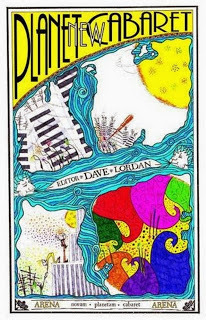 Do you like New Year's Eve? I don't particularly. It has never been a big deal in our family though in my twenties I did the obligatory pub/house-party thing. Nowadays my husband and I usually have no plans. So when Nuala at Arena asked me if I'd like to come to RTÉ, Donnybrook, for a special programme about their recent New Island-published New Planet Cabaret anthology, I immediately said, 'Yes!'
Do you like New Year's Eve? I don't particularly. It has never been a big deal in our family though in my twenties I did the obligatory pub/house-party thing. Nowadays my husband and I usually have no plans. So when Nuala at Arena asked me if I'd like to come to RTÉ, Donnybrook, for a special programme about their recent New Island-published New Planet Cabaret anthology, I immediately said, 'Yes!'New Planet Cabaret is edited by Dave Lordan and it's a mix of new and established voices, contemplating modern life in very short forms - short-shorts/flash and poetry, mostly. Much of the writing is extraordinary - interesting language and odd situations abound. My own story in the book 'Sunasawsta' features a seasonal robin (I wrote it on Christmas Day 2012), a pair of smug-marrieds and a surprise inheritance.
Some of the writers featured in the book are gathering on NY's Eve in the Arena RTÉ studio at 7pm to talk about the book and read from it and we'd be delighted if you would tune in. If nothing else it will remove me from the temptation of the Roses, the dark Toblerone, the shortbread, the prosecco, the chocolate buttons, the red wine, the Roses, the Roses, the Roses...
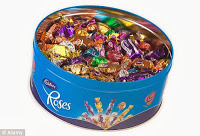
Published on December 29, 2013 05:02
December 23, 2013
'WHO ARE WE?' - ANNE ENRIGHT
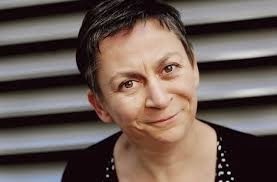
CUNY TV has a great interview with Anne Enright on their site. It's part of a series with Irish writers in America. I sniggered when she said, 'In Ireland you are always writing the wrong book...the wrong book for Ireland now.' And then with her hand on her forehead, 'Who are we?!' She blames journalists, of course. I love Anne's writing. I love her honesty and humour and the way she is resolutely herself.
Anne has a good article on home in the Irish Times here which is well worth reading. It begins: 'I was on the road a lot, for a few years, selling books like a salesman sells brushes (except these, of course, are magic brushes), and one of the great pleasures of being a writer on the move is that you can talk to anyone. People tell you things.' So true! I've had many a life story told to me on aeroplanes this year.
Published on December 23, 2013 08:13
December 19, 2013
FURTHER INFO ON RTE & NEW ISLAND BOOK COMP
Further info on The Today Show RTE's "Publish your Novel" competition in conjunction with New Island:
We are looking for works of fiction, any genre including Literary Fiction, Crime Fiction, Short Stories, children’s and YA. Please do NOT Submit non-fiction, Drama or Poetry.
We ONLY accept submissions if they adhere to the following guidelines:
1) Submissions are sent by email to: editor[AT]newisland.ie with “competition submission” in the subject line
2) Attach the first 50 pages of your novel, PLUS a synopsis of the novel (no longer than 500 words) as two separate Word documents (.doc or .docx)
3) Printed manuscripts will not be accepted, nor will manuscripts contained on CDs or other storage devices sent by post
4) Entries will only be accepted between 16:00hrs on Friday 10th January and Midnight Sunday 25th January 2014
5) Shortlisted authors will be contacted before Friday 21st February 2014.
We are looking for works of fiction, any genre including Literary Fiction, Crime Fiction, Short Stories, children’s and YA. Please do NOT Submit non-fiction, Drama or Poetry.
We ONLY accept submissions if they adhere to the following guidelines:
1) Submissions are sent by email to: editor[AT]newisland.ie with “competition submission” in the subject line
2) Attach the first 50 pages of your novel, PLUS a synopsis of the novel (no longer than 500 words) as two separate Word documents (.doc or .docx)
3) Printed manuscripts will not be accepted, nor will manuscripts contained on CDs or other storage devices sent by post
4) Entries will only be accepted between 16:00hrs on Friday 10th January and Midnight Sunday 25th January 2014
5) Shortlisted authors will be contacted before Friday 21st February 2014.
Published on December 19, 2013 11:21
December 17, 2013
BOOK-DEAL COMP - NEW ISLAND & THE TODAY SHOW, RTÉ
 Maura Derrane & Daithí O Sé of The Today ShowI'm in Cork to record a piece for RTÉ TV's The Today Show about a fab new book-deal comp from my publisher New Island. Tune in Friday 20th for details! From 4.30pm.
Maura Derrane & Daithí O Sé of The Today ShowI'm in Cork to record a piece for RTÉ TV's The Today Show about a fab new book-deal comp from my publisher New Island. Tune in Friday 20th for details! From 4.30pm.'The Today Show in conjunction with publishers New Island and Little Island want to turn a Today show viewer into a best-selling author. The winner’s book will be published and will be in shops this time next year. They are looking for fiction in any genre, including children’s books (no picture books). Entries open early in January 2014, so it will give you some time to get your manuscript into shape.'
Published on December 17, 2013 23:00
December 16, 2013
TWO FLASH COMPS
Two flash comps you might be interested in, dear readers. One from the Rape Crisis Centre in Galway, one from Ginosko mag in Canada.
This is a Story invites entries of all original unpublished work of up to 500 words and the cost is €5 per entry (3 entries for €10). There is no theme or subject limitations and entries will be judged anonymously by author Mike Mc Cormack. You can enter by post, by e-mail or by Facebook and the deadline is January 14th 2014. Prize: €300.
Send entries to GRCC, "The Lodge" Forster Court, Galway with cheques/postal orders made out to Galway Rape Crisis Centre.Overseas entries:a) enter via website using a credit cardb) enter by sending a paypal payment to coordinator@galwayrcc.orgc) enter by post
Competition winners are informed around late Febuary but the official announcement is made at the time of the prizegiving – this year it will mid March 2014. Check the website after this date or send an SAE for the list of winners and judges’ reports.More info: Aoife Ní Laoi - fundraiser@galwayrcc.org
*
Ginosko Flash Fiction Contest$250 Award, $5 entry fee, deadline March 1, 2014.Submit up to 2 pieces, 800 words maximum each piece.
Final Judges: Maggie Heaps, Michael Hettich, Gary Lundy, E M Schorb, Larissa Shmailo, Andrena Zawinski, Andrei Guruianu, Robert Paul Cesaretti.Awarded work will be published in Ginosko Literary Journal, http://GinoskoLiteraryJournal.com/
Guidelines and Eligibility:The Ginosko Flash Fiction Award is for an unpublished work of flash fiction. Awarded piece is selected through a submission process open to all writers with the following exception:Relatives or individuals having a personal or professional relationship with any of the final judges where they have taken any part whatsoever in shaping the submitted manuscript.
Procedures and Considerations:Please submit work, along with a brief bio, and cover letter if desired, to GinoskoContest@gmail.com. Attachments must be in .wps, .doc, .rtf, or .pdf form, otherwise they will not be considered (please include last name on every page submitted). Send print submissions to:
CONTESTGinosko Literary JournalPO Box 246Fairfax, CA 94978
Payment Procedures:Online submissions will receive emailed invoices via PayPal, though you do not need a PayPal account. Print submissions may send $5 in cash or check (made payable to Ginosko Literary Journal) to the above address.
This is a Story invites entries of all original unpublished work of up to 500 words and the cost is €5 per entry (3 entries for €10). There is no theme or subject limitations and entries will be judged anonymously by author Mike Mc Cormack. You can enter by post, by e-mail or by Facebook and the deadline is January 14th 2014. Prize: €300.
Send entries to GRCC, "The Lodge" Forster Court, Galway with cheques/postal orders made out to Galway Rape Crisis Centre.Overseas entries:a) enter via website using a credit cardb) enter by sending a paypal payment to coordinator@galwayrcc.orgc) enter by post
Competition winners are informed around late Febuary but the official announcement is made at the time of the prizegiving – this year it will mid March 2014. Check the website after this date or send an SAE for the list of winners and judges’ reports.More info: Aoife Ní Laoi - fundraiser@galwayrcc.org
*
Ginosko Flash Fiction Contest$250 Award, $5 entry fee, deadline March 1, 2014.Submit up to 2 pieces, 800 words maximum each piece.
Final Judges: Maggie Heaps, Michael Hettich, Gary Lundy, E M Schorb, Larissa Shmailo, Andrena Zawinski, Andrei Guruianu, Robert Paul Cesaretti.Awarded work will be published in Ginosko Literary Journal, http://GinoskoLiteraryJournal.com/
Guidelines and Eligibility:The Ginosko Flash Fiction Award is for an unpublished work of flash fiction. Awarded piece is selected through a submission process open to all writers with the following exception:Relatives or individuals having a personal or professional relationship with any of the final judges where they have taken any part whatsoever in shaping the submitted manuscript.
Procedures and Considerations:Please submit work, along with a brief bio, and cover letter if desired, to GinoskoContest@gmail.com. Attachments must be in .wps, .doc, .rtf, or .pdf form, otherwise they will not be considered (please include last name on every page submitted). Send print submissions to:
CONTESTGinosko Literary JournalPO Box 246Fairfax, CA 94978
Payment Procedures:Online submissions will receive emailed invoices via PayPal, though you do not need a PayPal account. Print submissions may send $5 in cash or check (made payable to Ginosko Literary Journal) to the above address.
Published on December 16, 2013 23:00
Nuala Ní Chonchúir's Blog
- Nuala Ní Chonchúir's profile
- 41 followers
Nuala Ní Chonchúir isn't a Goodreads Author
(yet),
but they
do have a blog,
so here are some recent posts imported from
their feed.



